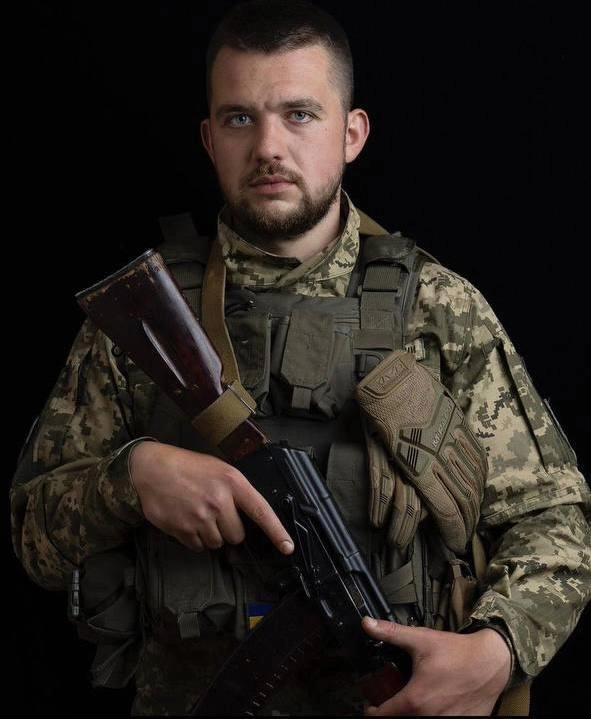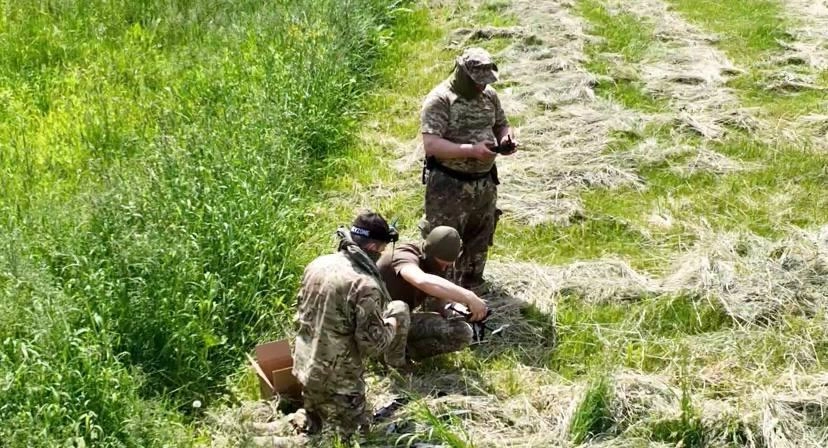Serhiy Kolesnychenko is 24 years old – one and a half of which he has been carrying a weapon. His entire civilian life, working in journalism and acting in the theater, has been put on hold since Feb. 24, 2022.
Early that morning, with the world still asleep, Serhiy was already on his way to the military headquarters in Bucha, just outside of Kyiv. There he joined one of the territorial defense brigades and began his journey as a fighter on the outskirts of Kyiv.
JOIN US ON TELEGRAM
Follow our coverage of the war on the @Kyivpost_official.
Next came the Kharkiv region. Then, after his transfer to another unit that works with drones, he was sent to the eastern and southern sectors.
On the anniversary of the Kharkiv region’s liberation, Serhiy spoke to Kyiv Post about that counteroffensive, and why it can’t be compared to the current one in Zaporizhzhia.
We spoke via Skype, because he “practically never leaves the front line.” And although he admits that he often dreams of civilian life, he understands that the path to victory is very long.
We shouldn’t expect any quick counterattacks.
Preparations for the offensive
“It was hard to look into the eyes of people who survived the occupation,” he said. “They were devastated. All they had was pain. But at the same time, gratitude.”
Serhiy’s unit went to the Izyum district in the Kharkiv region at the beginning of June 2022. Before that, after the liberation of the Kyiv region, the military prepared on training grounds.

Trembita ‘People’s Missile’ Drone Makes First Public Appearance
“I remember I was on duty. My brother-in-arms and I saw that our aviation was starting to work, some serious battles were beginning, including the Kraken special forces unit, which advanced very actively and bravely. These assault units were taking positions, and we were immediately entrenched in them. Basically, we were already like the second echelon,” the soldier explained.
In his memories, everything was gray, “like footage of Chornobyl.” Every village and town was destroyed.
“We went there, marked where there was a mine, where there was an unexploded shell, and prevented looting. We fed people. Some almost threw themselves at the food. It can’t be explained in words. Adult military men could barely hold back their tears. Villages were destroyed – some completely. But even there, some people managed to survive. They talked about torture. They even showed us the torture chambers.”
Serhiy Kolesnychenko
The liberation of the entire region happened quickly. As for how that was possible Serhiy only said that everything was planned secretly and carefully. The Russians weren’t ready. Local residents said that the occupiers fled so quickly that they left their belongings and weapons behind.
The Slobozhan counteroffensive (as Ukrainians now call the liberation of the region) began on Sept. 6, 2022. Before that, at the end of August, a counteroffensive had begun in the “distant” Kherson region in the south of Ukraine. Russia had concentrated all its attention there, not expecting anything in other sectors.
As a result of the Kharkiv special operation, more than 6,000 square kilometers of Ukrainian territory were liberated in a matter of days. The whole country rejoiced, and much of world with it. Then the tears of joy turned into pain and rage when they saw the consequences of the occupation. Torture, executions and mass graves... It’s hard to imagine what would have happened if the offensive had taken place later.
“They didn’t expect it, which is why everything was so fast. But that won’t happen a second time,” Serhiy said.
Today’s counteroffensive
Today Serhiy is already active in the current counteroffensive in the Zaporizhzhia sector. He says that in the Kharkiv region, he first saw what phosphorous bombardment is like. Still, nothing he has seen before is comparable to the south.
“This is where I first came across the KABs [precision guided bombs]. You hear a tremendous roar and realize you won’t be able to hide anywhere. Either you’re lucky or not. And here everything is mined. I look at the thermal imager at night, the mines are still emitting heat. And you know... they’re on every square meter,” he said, reliving the fear.
The worst thing is that the best die.
Southern Ukraine is currently one of the most mined regions in the world. According to Serhiy, this shows that the Russians have been preparing for an offensive in these areas for quite some time. Other things also indicate readiness.
As a drone operator, what he sees gives him the chills.
“We shouldn’t expect any quick counterattacks. We have to understand that the farther we go, the slower everything will happen. I see such fortified areas in some settlements. They’ve been preparing for this for a year and a half. They’ve reinforced a lot of the approaches to villages with concrete. What can the infantry do? What can five Humvees do? Nothing!”
Serhiy is surprised by the fact that the West quite often talks about the slow pace of the counteroffensive. In his opinion, the offensive is moving as fast as possible under the given conditions. He adds that Ukraine has a total lack of weapons.
“Where have you seen an offensive without aviation?” he asks angrily. “They pummel us from the sky with everything they’ve got! On the ground, our infantry works great. But there’s nothing protecting us overhead. We need F-16s, everything would move much faster with them. We especially need more Western equipment. In my line of work, we don’t even have enough FPV [first-person-view] drones.”
Right now, the Ukrainian army is doing what no other army in the world has ever done before.
On his social network pages, Serhiy is constantly collecting money to buy various types of drones. He insists that this is absolutely necessary for this war because often the devices don’t survive more than a day before they’re destroyed.
One of his biggest dreams is for Ukraine to stop depending on foreign supplies and establish its own weapons production as much as possible.
Our interview didn’t last long, because you can’t talk for long at the front line, especially when half-ton guns are dropping nearby.
Finally, Serhiy answered my question: “What is the price of the counteroffensive?”
“The price? This is a difficult question. In general, the price in the whole war is high. It’s not only a counterattack,” he says.
“I understand that those who give us weapons, who watch from the sidelines, would like the war to end sooner. We would also like that. But we understand that this will not end quickly. People die every day. People who just wanted to live like everyone else. And the worst thing is that the best die. Those who know the price of freedom and proved it at the cost of their own lives.”
As for the concessions many Western observers are increasingly suggesting: “For anyone who says the counteroffensive is going too slow, you need to negotiate... No, no, and again, no. Right now, the Ukrainian army is doing what no other army in the world has ever done before. And after everything that’s been lost in almost 10 years of war, or even in so many centuries of being neighbors with Russia, can anyone still trust any agreement?”
You can also highlight the text and press Ctrl + Enter
















